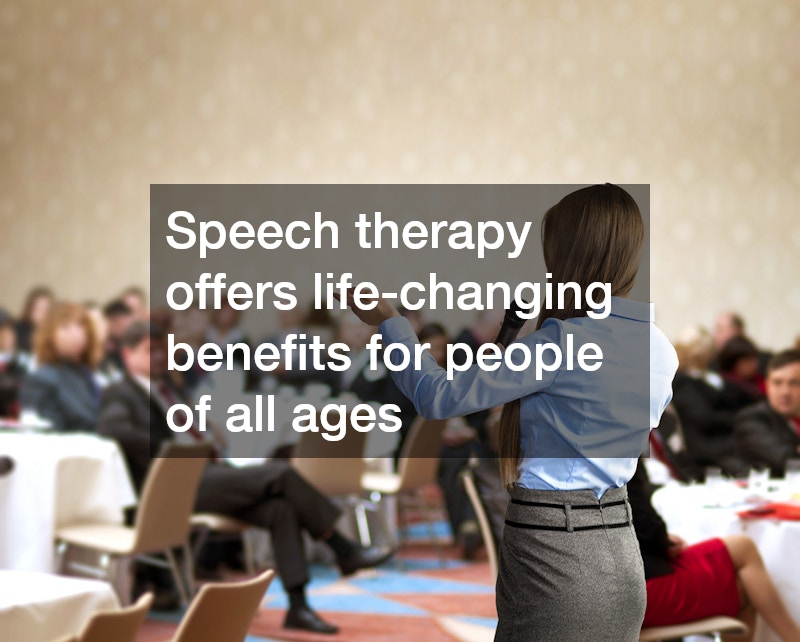What Are the Benefits of Speech Therapy?
Speech is a vital part of everyday communication. When speech and language challenges arise, whether in childhood or adulthood, they can significantly impact one’s ability to connect, learn and thrive. Speech therapy offers targeted strategies to overcome these barriers, making a meaningful difference in countless lives. From boosting communication skills to enhancing social and academic outcomes, speech therapy presents a wide range of benefits for people of all ages.
Supporting Children Through Early Intervention
One of the most critical benefits of speech therapy is early intervention for children. Developmental delays, speech sound disorders, stuttering and language comprehension issues can all be addressed with timely and structured support. By working with a qualified speech therapist, children receive customised techniques tailored to their specific needs.
Child psychologist Barbara Kapser, known for her work in developmental psychology, emphasises the importance of early identification and support. According to Kapser, “Speech therapy plays a crucial role in helping children reach their communication milestones. It builds not only speech clarity but also confidence in social settings.”
Many speech delays in children are linked to underlying conditions such as autism spectrum disorder (ASD), auditory processing disorder or developmental language disorder (DLD). Speech therapy offers a practical, evidence-based approach to mitigate these delays and equip children with the tools they need to succeed in school and peer interactions.
Improving Communication in Adults
Speech therapy is not just for children. Adults who have experienced a stroke, traumatic brain injury or neurological conditions such as Parkinson’s disease can greatly benefit from therapy to regain or enhance their communication skills. Speech-language pathologists help individuals with aphasia, dysarthria, voice disorders and other challenges that affect speech and language.
For instance, after a stroke, a person may have difficulty forming words or understanding speech. With consistent therapy, many patients can rebuild neural pathways, improving both expressive and receptive language skills. Speech therapists also assist in teaching alternative communication methods, such as using gestures or assistive technologies when verbal communication is compromised.
Beyond medical conditions, adults who struggle with social communication or public speaking may also seek out speech therapy. Gaining clarity, fluency and expressive ability can be transformative not just professionally, but personally as well.
Enhancing Social & Emotional Wellbeing
Speech therapy contributes to more than just verbal improvement. It often leads to better emotional wellbeing and stronger relationships. For children, being able to express thoughts and feelings reduces frustration and behavioural issues. Adults, on the other hand, gain greater confidence when they can communicate clearly in both social and work settings.
Child psychologists often observe a direct link between communication difficulties and emotional distress. Barbara Kapser notes that when a child cannot articulate their needs, it can lead to anxiety or withdrawal. “Supporting a child’s ability to communicate doesn’t just help their language—it fosters independence, emotional growth and resilience,” Kapser explains.
Speech therapists frequently work in tandem with psychologists and educators to ensure a well-rounded approach to a child’s development. This collaborative model ensures that children receive the support they need, both academically and emotionally.
Boosting Academic & Career Success
Clear communication is fundamental in both academic and professional settings. Children with speech and language difficulties often struggle with literacy skills such as reading, spelling and writing. Speech therapy addresses these foundational areas, helping students to better understand language structure, phonemic awareness and vocabulary.
Early speech therapy intervention has been shown to lead to improved classroom performance and a reduced need for special education services later on. By fostering effective communication skills, children are more likely to participate in discussions, ask questions and engage in learning activities.
Similarly, adults who improve their communication skills often see enhanced career prospects. Whether it’s presenting ideas in meetings, networking with confidence or managing customer interactions, speech therapy can unlock new professional opportunities.
Personalised & Evidence-Based Care
Speech therapy is never a one-size-fits-all solution. Each individual’s treatment plan is tailored to their unique challenges and goals. This personalised approach is grounded in clinical research and evidence-based methods. Whether delivered in a clinic, at home or via telehealth, therapy sessions are designed to be interactive, engaging and progress-oriented.
Speech-language pathologists often use play-based learning for young children, incorporating games, songs and stories to make sessions enjoyable and effective. For adults, therapy might include role-playing, vocal exercises or cognitive-linguistic tasks depending on the area of focus.
Family involvement is another vital element of successful speech therapy. When parents, caregivers or partners are included in the therapy process, the individual’s progress tends to be more consistent and sustainable.
A Lifelong Investment in Communication
The ability to communicate clearly and confidently is fundamental to success, independence and emotional wellbeing. Speech therapy offers life-changing benefits for people of all ages, from children facing developmental delays to adults recovering from injury or illness. With guidance from skilled professionals and input from allied specialists like child psychologists, individuals are empowered to reach their full communication potential.
Barbara Kapser’s insights remind us of the broader impact of speech therapy: “When we improve someone’s ability to communicate, we’re not just working on speech—we’re giving them a voice in their world.” For anyone facing communication challenges, speech therapy is a powerful tool for change, growth and connection.
.





Post Comment